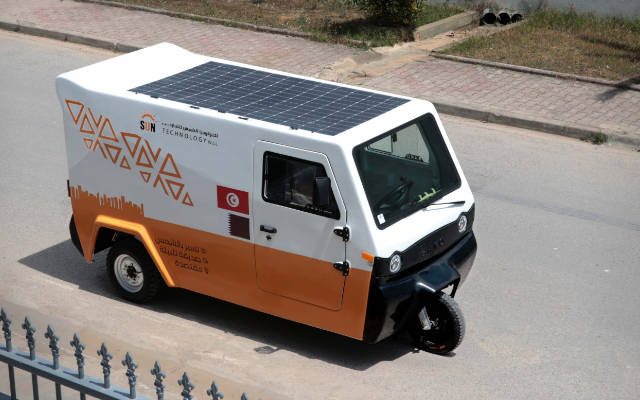Bako Motors: Tunisia's Solar EV Startup Expands Across Africa and the Gulf

Bako B1 electric delivery trike with solar charging
By EVWorld.com Si Editorial Team
Bako Motors is a Tunisian electric vehicle startup redefining micromobility across Africa and the Middle East with solar-powered tricycles and compact EVs designed for last-mile logistics and urban transport. Their vehicles are not Chinese knockdown kits but indigenous builds tailored to regional needs.
Founded in Tunisia, Bako Motors emerged from a pragmatic vision: to create affordable, sustainable transport solutions for urban and peri-urban environments underserved by conventional EV infrastructure. Their flagship model, the Bako B1, is a solar-assisted electric tricycle engineered for last-mile delivery. With a 2,000-liter cargo capacity and a rooftop solar panel capable of generating up to 50 km of free driving per day, the B1 is designed to operate in regions where grid access is limited or unreliable. This makes it especially attractive to logistics firms and e-commerce platforms seeking low-emission alternatives for dense urban corridors and informal delivery networks.
The company's presence at the 2025 Riyadh EV Auto Show marked a strategic pivot toward regional expansion. Bako Motors announced plans to establish operations in Saudi Arabia, Nigeria, and Qatar - markets aligned with the company's focus on scalable, clean mobility solutions. In Saudi Arabia, Bako has already broken ground on a local manufacturing facility, signaling a shift from export-based sales to regional assembly and adaptation. According to Ahmed Al-Ghamdi, Bako's business development and manufacturing lead in the Kingdom, the company is tailoring its vehicle configurations to meet the operational needs of local businesses, including partnerships with Amazon and other delivery platforms.
Unlike many low-cost EV startups that rely on Chinese knockdown kits, Bako Motors appears to be pursuing indigenous design and localized production. Their vehicles are built around modular platforms that can be adapted for cargo, passenger, or utility use. While detailed supply chain disclosures remain limited, the company emphasizes cost efficiency and energy performance. Al-Ghamdi claims the Bako B1 delivers up to 12 km per kilowatt-hour - an efficiency benchmark that outpaces traditional 91-octane gasoline vehicles in urban stop-and-go conditions.
Battery specifications have not been publicly detailed, but given the vehicle's solar integration and modest range requirements, it's likely that Bako uses lithium-ion packs optimized for short-range, low-speed duty cycles. The emphasis is on durability, simplicity, and low maintenance - qualities essential for fleet operators in emerging markets. Performance specs are modest by Western EV standards: the B1 is built for utility, not speed, with a focus on payload, maneuverability, and energy independence.
In addition to the B1 tricycle, Bako Motors offers two more automobile-like models: the Bee and the B-Van. The Bako Bee is a compact, solar-powered city car designed for personal transport. Available in trims like the Bee Wave and Bee Horizons, it features a minimalist design, rooftop solar panels, and seating for two. Pricing starts around 18,000 Tunisian dinars (roughly USD 5,800), making it one of the most affordable solar EVs on the market. Under optimal sunlight, the Bee can harvest enough energy to cover more than half of its daily driving needs.
The Bako B-Van is a larger, four-wheeled cargo vehicle built for commercial use. It offers up to 400 kg of payload capacity and a range between 100 and 300 kilometers depending on battery configuration and solar input. Its solar roof can contribute up to 50 km of driving per day, reducing reliance on grid charging and lowering operating costs for fleet managers. Both models are built on modular platforms and appear to be indigenously designed and manufactured in Tunisia, with additional R&D in France and a new plant underway in Saudi Arabia.
Bako's business model blends manufacturing with strategic localization. By establishing regional factories and adapting vehicle platforms to local conditions, the company avoids the pitfalls of one-size-fits-all EV deployment. Their approach is reminiscent
Sources
- Arab News - Saudi Arabia's EV Auto Show points way forward for clean mobility
- Electrek - Bako Motors builds solar-powered tiny electric cars
- Bako Motors - Official Models Page
- Automobile.tn - Bako Bee and B-Van pricing
- MyTEK - Bako Bee Horizons and Wave variants
- Indeksonline - Bako B-Van specs and range
Original Backlink
Views: 612
Articles featured here are generated by supervised Synthetic Intelligence (AKA "Artificial Intelligence").
